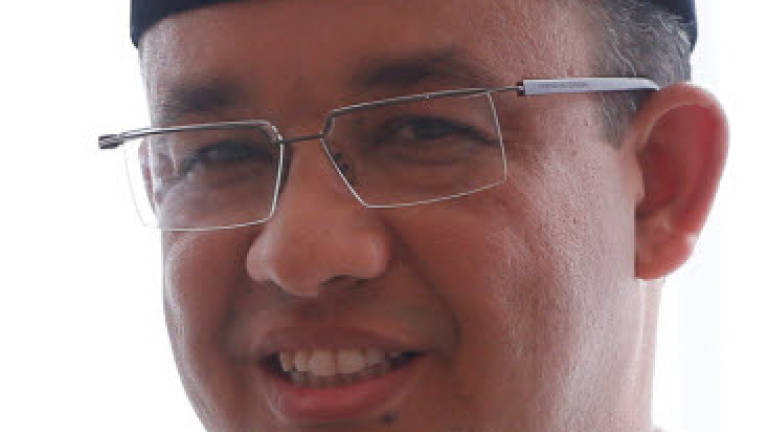'Ahok' concedes defeat in election to lead Jakarta


JAKARTA: The Christian governor of Jakarta, Basuki Tjahaja Purnama, conceded defeat today in a religiously-charged election to lead the Indonesian capital after unofficial vote counts showed a comfortable lead for his Muslim opponent.
"To our supporters, I know you are sad, but this is the will of God," said Purnama, who is better known by his nickname Ahok.
A representative selection of votes surveyed by several pollsters, referred to as quick counts, showed Purnama on 42% and rival Anies Baswedan commanding 58%.
The official tally from the run-off will not be announced until the first week of May, but the so-called quick counts have accurately predicted past elections.
Baswedan is backed by conservative Muslims who want incumbent Purnama jailed for a perceived insult to Islam that dogged his campaign.
Baswedan said after the first results came in that he would work to unite the divided electorate.
"We are committed to maintaining unity in Jakarta," he said.
"We want to celebrate pluralism and diversity."
The election was seen by some analysts as a test of secular democracy in the world's most populous predominantly Muslim country.
"Your vote will determine the direction of Jakarta," Purnama said after casting his ballot near his residence in North Jakarta.
"Let's celebrate democracy with joy," he said.
About 7 million of Jakarta's 10 million residents were eligible to vote.
Purnama's bid for a second term was hampered by a blasphemy case triggered by comments he made on the Quran.
Purnama's remarks that there were people who deceived Muslim voters into believing that the Quran commands them not to vote for Jews and Christians sparked massive street protests by conservatives in November and December.
He was charged with blasphemy and is facing a maximum five-year jail term if found guilty.
He remains free and a verdict is expected after the election.
He has apologised for the remarks, and said that he was referring to those who misused religion for political gain.
His campaign has warned that a victory for his Islamist-backed opponent could threaten diversity and pluralism.
"I voted for Ahok because he has proven to be a leader who gets things done and he represents diversity," said Rudy Pardede after voting at a polling station in central Jakarta.
Security was tight in the capital, with 65,000 police officers deployed to guard against voter intimidation.
Once a clear favourite, Purnama saw his poll numbers falling after the blasphemy accusations, as many conservative Muslims genuinely believe that he insulted Islam.
Conversely, support for the US-educated Baswedan rose after he met one of the leaders of the anti-Purnama protests, firebrand cleric Muhammad Rizieq Shihab.
Purnama, the first Christian to lead Jakarta in 50 years, has been perceived as an effective administrator in a bureaucracy long plagued by corruption and incompetence. He has won praise for cleaning up rivers clogged with rubbish in an effort to reduce flooding, a perennial problem in the city.
His administration has also built more parks and playgrounds. But he has caused resentment with his decision to evict poor residents from their riverbank homes and relocate some of them to cramped, low-cost apartments, where they have to find rent money despite having been separated from their source of income.
Baswedan, a respected academic, has capitalised on the discontent, vowing to upgrade existing houses instead of evicting.
The national elections commission will announce official results in early May.
Baswedan's big lead was surprising since opinion polls in the run-up to the election had pointed to a dead-heat. Purnama won the first round of voting for governor in February in a three-way race.
The election will be seen as a barometer for the 2019 presidential election, given Jakarta's outsized importance as both the nation's capital and commercial centre.
Purnama is backed by President Joko Widodo's ruling party. Baswedan is supported by a conservative retired general, Prabowo Subianto, who lost to Widodo in a 2014 presidential vote and may challenge him again.
But the election is also viewed as a test for Indonesia's young democracy and record of religious tolerance, with both sides raising concerns about intimidation and voter fraud.
The campaign featured mass rallies led by a hardline Islamist movement, which has strengthened in recent years in a country long dominated by a moderate form of Islam. More than 80% of Indonesia's population professes Islam.
'Politics of religion'
"Going forward, the politics of religion is going to be a potent force," said Keith Loveard, an analyst at Jakarta-based Concord Consulting and an author of books about Indonesian politics.
Some voters may have been reluctant to vote for Purnama because of worries about "five more years of protests on the streets by Muslim hardliners", Loveard said in a telephone interview.
Police said 15 people were detained following reports of disturbances at several polling stations in the city of 10 million people, after what the Jakarta Post this week dubbed "the dirtiest, most polarising and most divisive" election campaign the nation had ever seen.
"Political differences should not break our unity," President Joko Widodo said in a statement after casting his ballot at a central Jakarta polling station. "We are all brothers and sisters. Whoever is elected, we must accept."
Security appeared light at several polling stations, though police said 66,000 personnel were deployed across the city.
Police in neighbouring provinces on Java island searched private cars and public buses heading for Jakarta on Tuesday to look for sharp objects and explosives.
Jakarta police spokesman Argo Yuwono said police had stopped and searched vehicle heading for Jakarta on Tuesday to ensure "no movement of masses toward the capital".
Religious tensions have been an undercurrent in the campaign, with Purnama on trial for blasphemy over comments he made last year that many took to be insulting to Islam.
Hundreds of thousands of Muslims took to the streets late last year to call for his sacking and to urge voters not to elect a non-Muslim leader. One person died and more than 100 were injured after one protest turned violent.
Contesting the results
Baswedan, a respected scholar who many viewed as moderate, drew widespread criticism during the campaign when he aggressively courted the conservative Islamic vote, appearing publicly with hardline Islamic leaders during anti-Purnama rallies.
The former Fullbright scholar and head of Jakarta-based Paramadina University started a "Teach for Indonesia" program, which earned praise for championing education to poorer parts of eastern Indonesia.
Purnama faces up to five years in jail if convicted of blasphemy. His trial will resume on Thursday, when prosecutors will submit a sentence request.
The loser can contest the results in the Constitutional Court if the margin of victory is one percent or less.
Citigroup said in an investor note that, despite the potential for renewed protests if Purnama won, it was maintaining a Jakarta stock index target of 6,150 by the end of 2017, representing an 8% upside.
"As long as there are no security issues, the election outcome should not significantly stall the reform programme of the national government, in our view," it said. — Reuters